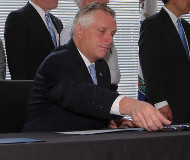Article from: www.thenewspaper.com/news/47/4700.asp
5/13/2015
License Plate Reader Controversy Grows In California, Virginia
California court rules that all motorists are constantly under investigation. Virginia governor embraces constant surveillance.
 The American Civil Liberties Union (ACLU) is mounting another challenge to the use of technology to spy on motorists. The organization filed suit last week against Fairfax County, Virginia for violating state data protection laws with its automated license plate reader program (ALPR, also known as ANPR). The civil rights group faces an uphill battle making its claim, as other challenges have not fared well.
The American Civil Liberties Union (ACLU) is mounting another challenge to the use of technology to spy on motorists. The organization filed suit last week against Fairfax County, Virginia for violating state data protection laws with its automated license plate reader program (ALPR, also known as ANPR). The civil rights group faces an uphill battle making its claim, as other challenges have not fared well.
On Monday the California Court of Appeal issued a modified opinion rejecting the ACLU lawsuit against law enforcement agencies in the Los Angeles area. The civil rights group had joined the Electronic Freedom Foundation in seeking to force disclosure of a week's worth of actual ALPR records to demonstrate how the systems are used to monitor the public. A three-judge panel decided to shield the program that scans about three million license plates every week from any further scrutiny. The Los Angeles Police Department retains the records for five years, and the sheriff's department retains them for two years.
Under state law, records of an investigation are not subject to public records requests. The judges reasoned that the departments are conducting "investigations" into three million motorists every week, which makes the surveillance records exempt from disclosure.
"Nor does the fact that the ALPR system scans every license plate within view, regardless of whether the car or its driver is linked to criminal activity, mean the system is not performing an investigation," Justice Patti S. Kitching wrote for the court. "The ALPR system necessarily scans every car in view, just as human officers would in attempting to identify a stolen vehicle. The fact that non-hot list vehicles are necessarily checked does not mean there was no investigation."
The Virginia General Assembly tried to rein in police agencies that retain the location information of innocent motorists for several years. The proposed law would have required a warrant to be issued before police could license plate camera records beyond seven days. On April 30, Governor Terry McAuliffe (D) vetoed the bill on the grounds that it would have threatened toll road revenue.
"This bill also sets a strict, seven day retention period for all data collected by LPRs," McAuliffe wrote in his veto message. "Many localities in Virginia retain this data for 60 days to two years. Seven days is a substantial reduction... The bill could potentially cripple the use of innovative, electronically-managed tolling lanes that improve the quality of life for Virginians by reducing commute times and expediting the tolling process... Accordingly, I veto this bill."
A copy of the California decision is available in a 140k PDF file at the source link below.
Source: ACLU v. Los Angeles Superior Court (Court of Appeal, State of California, 5/11/2015)
Permanent Link for this item
Return to Front Page
 The American Civil Liberties Union (ACLU) is mounting another challenge to the use of technology to spy on motorists. The organization filed suit last week against Fairfax County, Virginia for violating state data protection laws with its automated license plate reader program (ALPR, also known as ANPR). The civil rights group faces an uphill battle making its claim, as other challenges have not fared well.
The American Civil Liberties Union (ACLU) is mounting another challenge to the use of technology to spy on motorists. The organization filed suit last week against Fairfax County, Virginia for violating state data protection laws with its automated license plate reader program (ALPR, also known as ANPR). The civil rights group faces an uphill battle making its claim, as other challenges have not fared well.